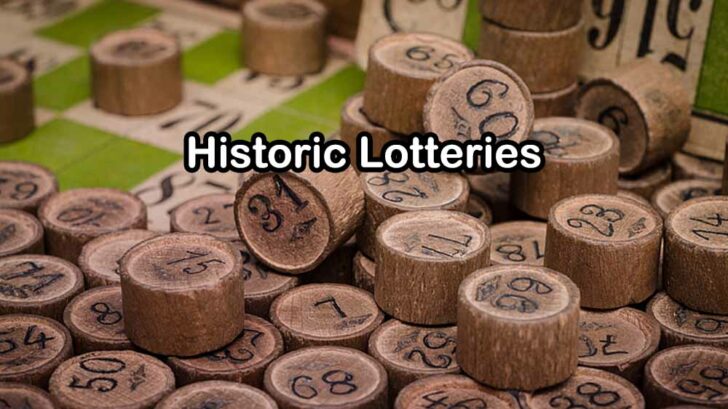Notable Lotteries from History

Athenian Democratic Lotteries
Starting off in the 6th century BC, we’ll visit the Greek city state of Athens. Of course we all know that this was the seat of democracy. They would hold a lottery, not so that some random citizen could win a prize, but as a means of choosing their leaders. This took place via a system of random allotments or “sortition”. The hopeful candidates would have their names recorded and then placed into the lottery. Interestingly, the Athenians believed that luck was the best selector.
The Fight Against Corruption
It meant there could be no corrupting influences from money or political influences. For the actual draw itself, they invented a special tool, called a “kleroterion”. This was designed to ensure a completely random draw. The device was a slab of stone with small slots chiseled out and which then held an identifying token of each participant. Black and white pebbles would be fed into one end, and as the tumbled out they would, depending on where they landed, indicate the selected candidate.
Lotteries From History: Keno
Today you can find Kino on all the best online casinos with jackpots. Though it’s beginnings are lost in history, it was thought to have begun in China around 2,000 years ago during the Han Dynasty-era. This ancient game was called “baige piao,” or “white pigeon ticket,” and was a lottery styled game. Participants would select a series of numbers or symbols and then win a prize. This was an extremely popular pastime across the whole of China. So much so, that the provincial governments would use the game as a means of raising funds for both military and public projects. It’s even believed that funds from the game helped with the construction of the Great Wall.
Lotteries From History: Roman Decimation
Of all the lotteries from history, you most definitely don’t want to win this one. In ancient Rome, a form of lottery was used in the punishment of disgraced soldiers and legionaries. Call a “decimation”, this form of military justice was a lottery to choose at random which soldier out of a group of ten would be punished. They were usually beaten to death by comrades. The chronicler Polybius wrote that these lotteries were to set an example for the rest of the army. “The best possible means are thus taken to inspire fear for the future, and to correct the mischief which has occurred. The danger and dread of drawing the fatal lot affects all equally, as it is uncertain on whom it will fall,” he writes in his Histories.
16th Century Italian Lotteries
For the modern form of lottery you can thank the Italian Renaissance. Here all lot-based games were popular. They were used as a form of tax to fund public works. Lotteries were a fact of life throughout Italy. They were first seen in a number of cities including Rome, Venice and Florence at the beginning on the 1500’s. Though the prizes were often cash, you could also win luxury items such as rugs, jewelry, servants and buildings. You could even win governmental contracts allowing you to collect taxes and tolls.
The Pope Doesn’t Play
In the city of Genoa, the lottery was used to select members of the city’s council, choosing 5 public figures from among more than 90 candidates. In that particular case, when the original selection was announced, people started betting on the outcome. So successful was this game, that the government took it over. The famous Rialto Bridge in Venice was built from funds acquired in this manner. Still, not everyone was happy with the popularity of the lottery. Several Popes threatened participants with ex-communication. And the church made several unsuccessful efforts to ban lottery game all together.
Lotteries From History: Queen Elizabeth’s Lottery

Not to be outdone by those Italians, the English held their first state lottery in 1567, under the reign of Queen Elizabeth 1st. This was yet another one of those lotteries from history that was organized to raise funds for “reparation of the havens and strength of the Realm, and towards such other public good works.” Unfortunately the initial ticket price to the general public was far too high at 10 shillings a go. Prizes included 5,000 sterling in cash, plates, armor, tapestries and fine linens. But the public’s response to this was luke warm to say the least. But it did mark the beginnings of lottery culture in England. Later lotteries were used to raise funds for public works. Later still, the Virginia Company of London ran a lottery. This was to help the poor souls of the Jamestown colony in North America.
The French National Lottery
Though lotteries first appeared in France around the 16th century, they didn’t really take off until the mid -1700’s. As with most rulers, the French monarchy considered the lottery as an excellent means of raising funds, without raising taxes. The money would be used towards funding public projects like hospitals, roads, churches, universities and alms for the poor. To show that they were fair, the draw was carried out by a young blindfolded child who would select the winner from a giant spinning “Wheel of Fortune”.
French Royal Monopoly
The popularity of these games grew at a massive rate. So much so, that the King decided to completely monopolize the whole industry and founded the National Lottery. Apart from a brief respite during the French revolution, the lottery continued to be popular throughout France. In 1836, it was abolished because it was seen as a tax on the poor. The state lottery re-appeared in 1930.
Lotteries From History: El Gordo
Today in Spain you can buy a ticket for the National Lottery from any of the thousands of lottery ticket outlets throughout the country. Called “El Gordo” or “The Fat One” it’s been a stable Christmas holiday fixture since 1812. At that time the Spanish government was strapped for cash due to funding the Peninsular War. This conflict was being fought by Bourbon Spain and Portugal, (assisted by the United Kingdom). It was against the occupying forces of the First French Empire for control of the Iberian Peninsula. Orphan boys would draw the winning ticket from a gold pot. Today this tradition still continues as boys from the boys home of San Ildefonso School, still announce the winner on December 22. Unlike many lotteries from history, El Gordo has never missed a draw for over 200 years ans even continued during the Spanish Civil War.
The Louisiana State Lottery Company
From the 1700’s lotteries were also popular in the US. In fact, both George Washington and Benjamin Franklin both ran lotteries. But corruption, scandal and moral outrage led to it’s timely demise and it was banned in may states. But one place where it remained untouched was in the state of Louisiana. The Louisiana State Lottery Company was a privately owned enterprise which started to grow after the Civil War. With it’s base in New Orleans, it stretched out to cover virtually the whole of the US. Such was the companies reach, it was nick-named, “The Octopus”. Havimg such a reach along with a virtual monopoly, and it wasn’t long before it became famous for it’s shady practices. It became well known for greasing the palms of politicians and judges.
The End Of The Road
The company’s bribes were to ensure that no other competition would surface anywhere in the US. After a good and profitable 25 year run, congress banned all lottery games ticket sales across state lines in the 1890’s. This marked the beginning of the end for this company. They moved to Honduras for a short while, but the company finally folded in the early 20th century. Such was the stench of corruption, Louisiana didn’t launch their own state lottery until 1991.
Nowadays lotto is the most popular form of gambling in the US. Stay tuned to be aware of the latest jackpot ratings.
















